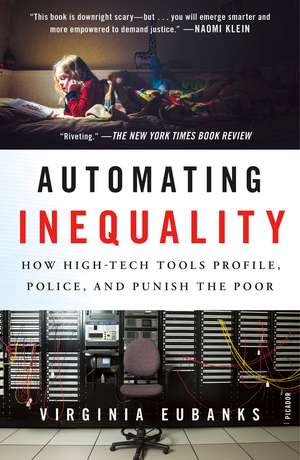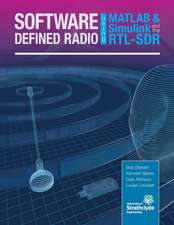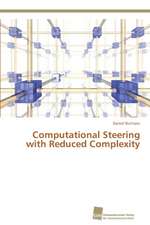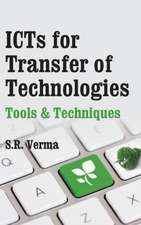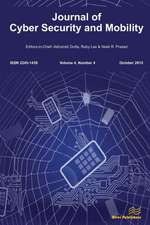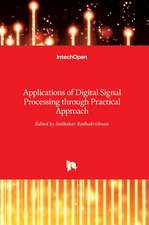Automating Inequality
Autor Virginia Eubanksen Limba Engleză Paperback – 6 aug 2019
Astra Taylor, author of The People's Platform: The single most important book about technology you will read this year.
Dorothy Roberts, author of Killing the Black Body: A must-read. A powerful investigative look at data-based discrimination?and how technology affects civil and human rights and economic equity The State of Indiana denies one million applications for healthcare, foodstamps and cash benefits in three years--because a new computer system interprets any mistake as "failure to cooperate." In Los Angeles, an algorithm calculates the comparative vulnerability of tens of thousands of homeless people in order to prioritize them for an inadequate pool of housing resources. In Pittsburgh, a child welfare agency uses a statistical model to try to predict which children might be future victims of abuse or neglect. Since the dawn of the digital age, decision-making in finance, employment, politics, health and human services has undergone revolutionary change. Today, automated systems--rather than humans--control which neighborhoods get policed, which families attain needed resources, and who is investigated for fraud. While we all live under this new regime of data, the most invasive and punitive systems are aimed at the poor. In Automating Inequality, Virginia Eubanks systematically investigates the impacts of data mining, policy algorithms, and predictive risk models on poor and working-class people in America. The book is full of heart-wrenching and eye-opening stories, from a woman in Indiana whose benefits are literally cut off as she lays dying to a family in Pennsylvania in daily fear of losing their daughter because they fit a certain statistical profile. The U.S. has always used its most cutting-edge science and technology to contain, investigate, discipline and punish the destitute. Like the county poorhouse and scientific charity before them, digital tracking and automated decision-making hide poverty from the middle-class public and give the nation the ethical distance it needs to make inhumane choices: which families get food and which starve, who has housing and who remains homeless, and which families are broken up by the state. In the process, they weaken democracy and betray our most cherished national values. This deeply researched and passionate book could not be more timely.
Preț: 106.20 lei
Nou
Puncte Express: 159
Preț estimativ în valută:
20.33€ • 22.09$ • 17.09£
20.33€ • 22.09$ • 17.09£
Carte disponibilă
Livrare economică 31 martie-14 aprilie
Preluare comenzi: 021 569.72.76
Specificații
ISBN-13: 9781250215789
ISBN-10: 1250215781
Pagini: 288
Dimensiuni: 139 x 210 x 22 mm
Greutate: 0.25 kg
Editura: Pan Macmillan
ISBN-10: 1250215781
Pagini: 288
Dimensiuni: 139 x 210 x 22 mm
Greutate: 0.25 kg
Editura: Pan Macmillan
Cuprins
Author's Note
Introduction: Red Flags
1: From Poorhouse to Database
2: Automating Welfare in the Heartland
3: High-Tech Homelessness in the City of Angels
4: The Allegheny Algorithm
5: The Digital Poorhouse
Conclusion: Dismantling the Digital Poorhouse
Acknowledgments
Sources and Methods
Endnotes
Index
Introduction: Red Flags
1: From Poorhouse to Database
2: Automating Welfare in the Heartland
3: High-Tech Homelessness in the City of Angels
4: The Allegheny Algorithm
5: The Digital Poorhouse
Conclusion: Dismantling the Digital Poorhouse
Acknowledgments
Sources and Methods
Endnotes
Index
